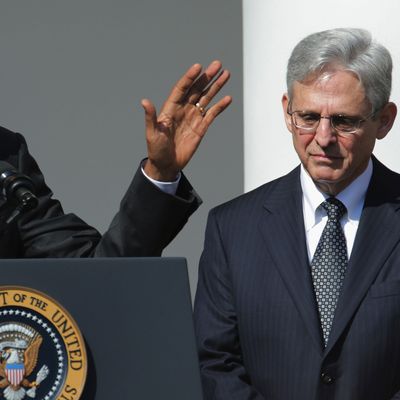
This week, a conservative Supreme Court majority — which only exists because Senate Republicans nullified Barack Obama’s right to appoint justices, and the Electoral College vetoed the American electorate’s preferred 2016 presidential candidate — empowered Donald Trump to enact racially motivated immigration restrictions, Texas Republicans to deliberately diminish the political power of nonwhite voters, and pro-life pregnancy crisis centers to withhold information about abortion services from their female patients. Tomorrow, it is all but certain to shatter what remains of the American labor movement on grounds so specious, even some libertarian legal scholars reject them.
Primary responsibility for this state of affairs lies with Mitch McConnell, the Federalist Society, and the conservative movement’s relentless organizing around the judiciary, more broadly. Some lesser portion lies with Jill Stein, Hillary Clinton’s campaign, and progressive voters who declined to perform their civic duty on November 8, 2016.
But one can also sprinkle a scintilla of blame on whoever convinced the last Democratic administration to nominate a middle-aged, white male centrist to the Supreme Court — and to then argue for his confirmation on grounds of procedural norms, rather than ideological goals.
The past few weeks have brought the enormous stakes of controlling the high court to national attention. And, in so doing, they’ve reminded political observers of how many trivialities (emails, a bout of pneumonia, deplorables, etc.) loomed larger in the 2016 campaign than the question of whether public-sector unions should be decimated, or the voting rights of racial minorities protected, or any of the other jurisprudential debates that the Trump-Clinton contest would settle.
In hindsight, it’s hard to argue that Democrats did everything in their power to increase the salience of such questions. For example, imagine if Barack Obama had nominated the first African-American woman to the Supreme Court — one who was young, and unabashedly progressive in her jurisprudence. When McConnell subsequently vetoed her appointment — and thereby nullified Obama’s attempt to give a modicum of representation in the halls of high power to the Democratic Party’s most loyal constituency — wouldn’t it have been easier to mobilize the Democratic base in outrage, than it was to rally them behind Merrick Garland?
Democrats could have painted McConnell’s unprecedented act of obstruction as one of racial animus. Then, when Republicans persisted, they could have combined this identity-based appeal with paid advertisements spotlighting how the Roberts Court had eviscerated voting rights, legalized bribery, disempowered consumers, and abetted the dominance of employers over workers — while explaining how Antonin Scalia’s replacement could exacerbate these horrors, or reverse them. Hillary Clinton could have campaigned on a promise to install Obama’s nominee after November, and invited progressive voters to elect the first woman to the presidency — and (effectively) the first African-American woman to the Supreme Court.
Whether this would have boosted Democratic turnout enough to keep the Rust Belt blue is impossible to know. But there’s little doubt that the salience of Supreme Court control would have been higher in such a campaign. And even if that fact did not translate into a Clinton victory, it might have helped more liberal voters learn that Brown v. Board and Obergefell v. Hodges do not mean that the Supreme Court is their friend — a lesson that could prove vital going forward.
But Democrats forfeited this opportunity. Obama nominated the most blandly inoffensive left-of-center jurist he could find, on the presumption that if he showed some deference to Mitch McConnell’s caucus, they would have no choice but to hand over the conservative movement’s most-prized possession. This would have been an understandable gambit in the first year of his presidency; in the last, it was incomprehensible. When had congressional Republicans ever given Obama cause for believing that forbearance and compromise would be rewarded? When had they given him cause to doubt their commitment to preserving a reactionary judiciary?
Obama’s error was then compounded by the Democratic campaign aides and consultants who organized the “We Need Nine” project. This campaign was the party’s primary effort to rally public support for Garland’s nomination. And, as its title suggests, the campaign’s core arguments were procedural: The Senate had a duty to confirm any qualified justice put forward by the sitting president; nine was a more appropriate number of Supreme Court justices than eight.
Anyhow, relitigating the Democrats’ 2016 mistakes is so 2017. And hindsight is 20/20. Still, the Garland debacle is a testament to the perils of privileging norms and moderation over substance and base mobilization.
And Democrats would do well to keep those perils in mind going forward.






























